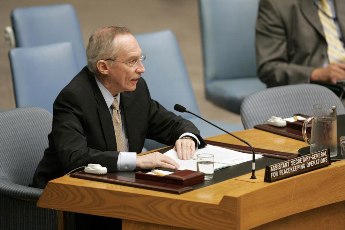UN official warns against isolating tribes from solution to Abyei
October 13, 2012 (KHARTOUM) – The UN’s assistant secretary general for peacekeeping operations Edmond Mulet warned on Saturday that isolating Al-Misseriya and Dinka Ngok tribes from any potential settlement of Abyei dispute between Sudan and South Sudan could lead to renewed confrontations.

The talks over Abyei collapsed after Khartoum rejected a proposal from African Union mediators to hold a referendum in the area in October 2013. Whereas Juba accepted the proposal, Khartoum argued that the criteria of voter eligibility would exclude Al-Misseriya who only reside in the region few months a year to graze their cattle.
Khartoum later indicated that it would prefer a political solution to the dispute and warned that a referendum could spark war between Dinka Ngok and Al-Misseriya, and potentially between Sudan and South Sudan.
In a meeting with Sudan’s state minister for foreign affairs Salah Wansi on the sidelines of the UN’s 76th General Assembly Session, Mulet said that reaching a settlement over Abyei without including Al-Misseriya and Dinka Ngok in the process could lead to renewed confrontations.
According to statements reported Sudan’s official new agency (SUNA) from New York, Wansi called on the international community to give the sides of the dispute enough opportunity to hold extensive consultations and discussions in order to reach a solution accepted by all sides.
Mulet however said that the recent agreements between Sudan and South Sudan had put relations between the two neighbors on the right track. He pointed out that the agreement to establish a demilitarized buffer zone along the unmarked 1800-km north-south border would help to rebuild confidence and facilitate a settlement to the conflict between the Sudanese government and the rebel Sudan People’s Liberation Movement North (SPLM-N) in the Sudanese border states of South Kordofan and Blue Nile.
For his part, the Sudanese minister conveyed his country’s keenness in continued cooperation with the UN’s peacekeeping operations department through the UN-AU Peacekeeping Mission in Darfur (UNAMID).
Wansi called on the UN to play a role in supporting the agreements reached between Sudan and South Sudan, reaffirming Khartoum’s commitment to the full implementation of the deal and resolution of the outstanding issues including Abyei.
Abyei’s status was supposed to be determined via a referendum under its own protocol of the 2005 Comprehensive Peace Agreement between Sudan and South Sudan. But the vote that was slated for January 2011 never took place as Khartoum and Juba disagreed over who has the right to vote.
Sudan wants Al-Misseriya to vote while Juba insists only the region’s indigenous population of Dinka Ngok be allowed to vote. The AU proposal on Abyei referendum gives the right to vote to the Dinka Ngok and permanent residents of Al-Misseriya.
(ST)
